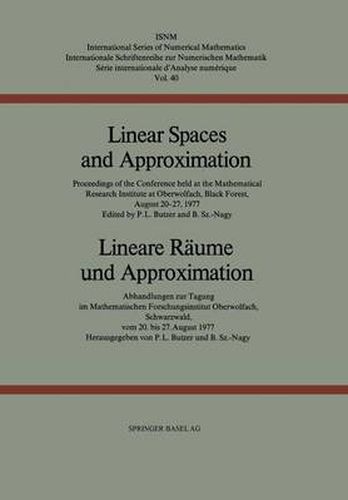Readings Newsletter
Become a Readings Member to make your shopping experience even easier.
Sign in or sign up for free!
You’re not far away from qualifying for FREE standard shipping within Australia
You’ve qualified for FREE standard shipping within Australia
The cart is loading…






This title is printed to order. This book may have been self-published. If so, we cannot guarantee the quality of the content. In the main most books will have gone through the editing process however some may not. We therefore suggest that you be aware of this before ordering this book. If in doubt check either the author or publisher’s details as we are unable to accept any returns unless they are faulty. Please contact us if you have any questions.
The publication of Oberwolfach conference books was initiated by Birkhauser Publishers in 1964 with the proceedings of the conference 'On Approximation Theory', conducted by P. L. Butzer (Aachen) and J. Korevaar (Amsterdam). Since that auspicious beginning, others of the Oberwolfach proceedings have appeared in Birkhauser's ISNM series. The present volume is the fifth * edited at Aachen in collaboration with an external institution. It once again ad dresses itself to the most recent results on approximation and operator theory, and includes 47 of the 48 lectures presented at Oberwolfach, as well as five articles subsequently submitted by V. A. Baskakov (Moscow), H. Esser (Aachen), G. Lumer (Mons), E. L. Stark (Aachen) and P. M. Tamrazov (Kiev). In addition, there is a section devoted to new and unsolved problems, based upon two special problem sessions augmented by later communications from the participants. Corresponding to the nature of the conference, the aim of the organizers was to solicit both specialized and survey papers, ranging in the broad area of classical and functional analysis, from approximation and interpolation theory to Fourier and harmonic analysis, and to the theory of function spaces and operators. The papers were supplemented by lectures on fields represented for the first time in our series of Oberwolfach Conferences, so for example, complex function theory or probability and sampling theory.
$9.00 standard shipping within Australia
FREE standard shipping within Australia for orders over $100.00
Express & International shipping calculated at checkout
This title is printed to order. This book may have been self-published. If so, we cannot guarantee the quality of the content. In the main most books will have gone through the editing process however some may not. We therefore suggest that you be aware of this before ordering this book. If in doubt check either the author or publisher’s details as we are unable to accept any returns unless they are faulty. Please contact us if you have any questions.
The publication of Oberwolfach conference books was initiated by Birkhauser Publishers in 1964 with the proceedings of the conference 'On Approximation Theory', conducted by P. L. Butzer (Aachen) and J. Korevaar (Amsterdam). Since that auspicious beginning, others of the Oberwolfach proceedings have appeared in Birkhauser's ISNM series. The present volume is the fifth * edited at Aachen in collaboration with an external institution. It once again ad dresses itself to the most recent results on approximation and operator theory, and includes 47 of the 48 lectures presented at Oberwolfach, as well as five articles subsequently submitted by V. A. Baskakov (Moscow), H. Esser (Aachen), G. Lumer (Mons), E. L. Stark (Aachen) and P. M. Tamrazov (Kiev). In addition, there is a section devoted to new and unsolved problems, based upon two special problem sessions augmented by later communications from the participants. Corresponding to the nature of the conference, the aim of the organizers was to solicit both specialized and survey papers, ranging in the broad area of classical and functional analysis, from approximation and interpolation theory to Fourier and harmonic analysis, and to the theory of function spaces and operators. The papers were supplemented by lectures on fields represented for the first time in our series of Oberwolfach Conferences, so for example, complex function theory or probability and sampling theory.